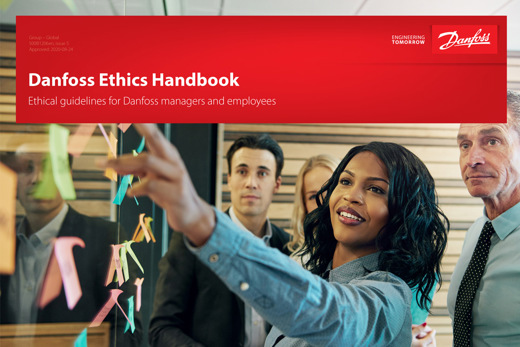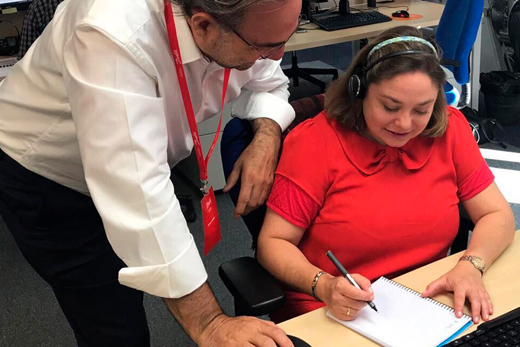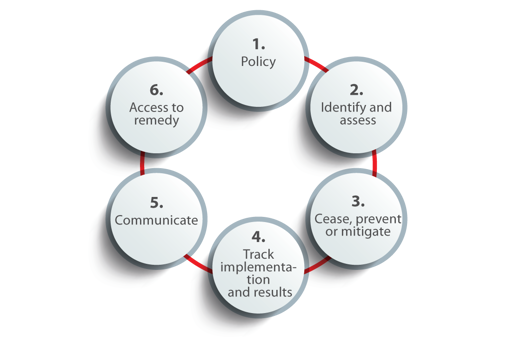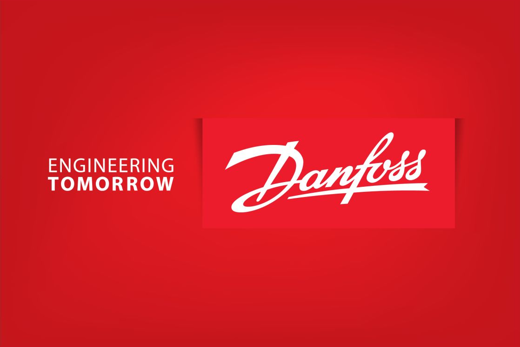Business ethics
Sustainability and ethical behavior are integral parts of our DNA. The respect for human rights, proper working conditions, and social and environmental considerations are integral parts of our identity.
Since 2002, Danfoss has been part of the UN Global Compact and its 10 principles for responsible business behavior. We are committed to aligning our business practices with the UN Guiding Principles for business and human rights.

Ethical guidelines and governance
We have implemented comprehensive compliance programs with mandatory training to minimize the risk of ethical non-compliance. The programs define clear ownership, and policies, including the Danfoss Ethics Handbook and Policies on Danfoss Business Conduct. Danfoss also conducts mandatory training on ethics, export control, fair competition, anti-corruption, and data privacy. For each topic, a target group is defined to cover all colleagues who have touchpoints with the respective subjects.
The Danfoss Board of Directors is responsible for oversight of ethics and compliance, and our Audit Committee assesses the effectiveness of the compliance programs. Responsibility for day-to-day ethics and compliance activities is anchored with the respective business segments and functions.
In addition, regular compliance awareness communication is provided to refresh colleagues on the ethical guidelines in our ethics handbook.

Whistleblower function
The Danfoss Ethics Hotline serves as our whistleblower function and grievance mechanism for human rights. It is hosted by an external operator, ensuring that colleagues and external stakeholders can report violations of legislation or internal ethics guidelines anonymously without risk of retaliation. In 2023, our whistleblower setup was updated to meet the requirements of the European Whistleblower Protection Directive.

Data privacy and data ethics
As processes in Danfoss become increasingly digitalized, we maintain a high focus on data privacy processes and compliance with data privacy regulations. We adhere to our Data Privacy Handbook, conduct training, and comply with data privacy legislation where we operate. Danfoss applies the same ethical values and guidelines to the processing of all data across the organization, going beyond compliance with data privacy legislation.

Ethics Hotline/Whistleblower
Danfoss has a whistleblower-function, Ethics Hotline, where you anonymously can report concerns or suspicions about violations of Danfoss ethical guidelines, criminal actions or human rights violations. The reporting line is open to employees, business partners and other impacted parties.
Additionally, employees can contact ‘AskEthics’ if they need advice on how to handle a difficult situation related to business ethics or how to apply company policy on a specific situation.

Handling of human rights
Respecting human rights is part of the Danfoss DNA, and we safeguard this value. We believe that human rights are about decency, and it is part of our responsibility as a global company to respect human rights.
We firmly support the principles of the UN Global Compact, of which we have been a member since 2002. Furthermore, we are committed to the UN Guiding Principles on Business and Human Rights, which outline the corporate responsibility to conduct due diligence for human rights along their value chains. This includes identifying, preventing, mitigating, and communicating about adverse human rights effects.
Danfoss’ due diligence process is risk-based and is focused on embedding human rights considerations in the regions where we operate. The regional top management oversees the process and approves local mitigation plans. Regular follow-up ensures progress and the regions with the highest risk of negative impacts on human rights are prioritized.
One outcome of the human rights due diligence process is the identification of our salient human rights, rights which we can potentially impact most severely.
One of the pillars of the UN Guiding Principles is to give access to remedy in case of adverse negative impacts on human rights, labor rights, or the environment. Danfoss has a process for how to handle such complaints.
To prepare for upcoming regulation on sustainability due diligence, in 2023, we initiated a human rights risk assessment pilot to revise and strengthen our human rights risk identification processes across the organization.

Mitigating modern slavery
Modern slavery is an umbrella term that covers forced labor, human trafficking, work performed involuntarily or under any threat of penalty. Danfoss addresses the risks of forced labor in our value chain and own operations. Areas at higher risk of forced labor in our supply chain include outsourced functions and services, such as transport, facility management, and recruitment. To address potential risks, we have initiated third-party SMETA audits (Sedex Members Ethical Trade Audits) focusing on forced labor.
Recruitment remains one of the sectors with the highest risk of forced labor in our supply chain, as various forms of fees and costs to workers can lead to debt bondage and other types of forced labor. As a result, we continue to focus on this area and conduct audits focusing on forced labor. Danfoss does not permit forced or involuntary labor in our supply chain. We ensure that suppliers we work with do not use or benefit from forced labor including forced prison work, work on a forced contract, slavery, and other forms of work, that are done against one’s will.

Responsible supplier management
Our Code of Conduct for Suppliers defines the Group’s ethical, environmental, and social requirements for suppliers. All suppliers must adhere to Danfoss’ Code of Conduct, and we perform regular supplier audits to verify compliance.
All new direct suppliers in high-risk countries are subject to internal audits and self-assessment questionnaires prior to having external audits. This is a precondition for being approved as a new supplier at Danfoss Sourcing Committee.
Existing direct suppliers are regularly visited by our Supplier Development Managers performing quality assessments and audits. If required, the existing suppliers are also subject to external audits.

Conflict and responsible minerals
Danfoss supports the efforts of governments and organizations to end violence and atrocities in conflict-affected areas. We are committed to sourcing materials and components from companies that also share our values regarding human rights, ethics, and environmental responsibility.
To ensure regulatory compliance, we engage with our suppliers regularly and support the Responsible Minerals Initiative, reviews. We run recurring campaigns to acquire supplier information on conflict minerals, including smelter/ refiner identification and country of origin. This has enabled us to provide conflict mineral reporting templates to our customers. Danfoss has also partnered with a third party to collect conflict minerals reporting templates (CMRT) from suppliers and conducts smelter due diligence campaigns.




